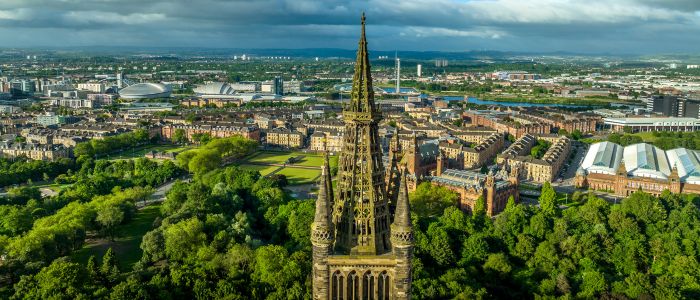University of Glasgow launches grant scheme to help local communities
Published: 10 April 2024
Charities and groups active in Glasgow Riverside Innovation District are invited to apply for sums up to £5,000

The University of Glasgow is inviting community groups, charities and projects working within Glasgow Riverside Innovation District (GRID) to apply for grants of up to £5,000.
The GRID Civic Grant Fund has been set up by the University to support communities in its surrounding areas.
The first round of the fund is now open for applications and closes on May 22, 2024. Up to £5,000 can be awarded for each successful project.
A GRID Civic Micro Grant Fund is also live and will be open all year round – with up to £850 available to help smaller projects.
Both funds are intended to support local groups to make a positive impact for those living, working and learning within the innovation district comprising G3, G11, G12 and G51 postcodes.
Funding support is available for a range of activities and projects including for example: equality, diversity & inclusion focused initiatives; health, wellbeing and fitness & sport; sustainability and climate change; food poverty; arts, heritage, and culture; education and outreach; finance / debt advice; underrepresented groups; and community spaces.
Applicants need to show their project aligns with one of the UN’s Sustainable Development Goals, which include for example tackling poverty, supporting good health and reducing inequalities.
GRID is a civic and economic partnership between the University of Glasgow, Glasgow City Council and Scottish Enterprise, and covers 700 acres from the edge of Glasgow city centre, through the West End and the University’s Gilmorehill campus to Govan and Linthouse.
The innovation district will be developed in the coming years to create opportunities in the form of accessible jobs and sustainable growth through investment in key sectors such as health, sustainability, and digital technologies, working alongside partners and stakeholders to enhance the economic, social and cultural wellbeing of communities.
Uzma Khan, Vice-Principal for Economic Development and Innovation, and Deputy Chief Operating Officer at the University of Glasgow, said: “We are delighted to launch our GRID Civic Fund and call on local communities within Glasgow Riverside Innovation District to take advantage of the new grant scheme.
“We understand that there are times when community groups need access to short-term cash to support or continue their important work.
“We are, at our heart, a civic university that is rooted in our communities. This fund offers us an opportunity to strengthen our links and relationship with the people who live in and around the University.
“Supporting communities and demonstrating the University’s civic purpose is one of the priorities for Glasgow Riverside Innovation District – our vision firmly believes that the benefits of growth and innovation that can be generated by universities like ours, sit hand-in-hand with our mission to change lives for the better.
“We are committed to working closely with our partners to ensure that GRID’s activity and eventual success results in tangible benefits that have a positive impact and, so far as possible, help and contribute to addressing challenges faced by our communities in parts of the city.”
GRID also covers the emerging cultural quarter around the Kelvingrove Museum & Art Gallery, the Scottish Events Campus, cultural and social clustering at SWG3 and the media hub at Pacific Quay, which includes the headquarters of BBC Scotland.
At its heart is a drive to develop opportunities, create businesses and jobs for a wide range of skill sets by investing in sustainable high-tech industries and infrastructure, while working alongside and understanding the needs of communities within GRID. The partnership also wants to build on the cultural strengths and social vibrancy of the district.
The University, as a civic institution, and its partners are passionate about developing extra funding and resources to help community leaders and community groups to overcome the challenges they face and continue to make a positive impact.
First published: 10 April 2024
<< April

